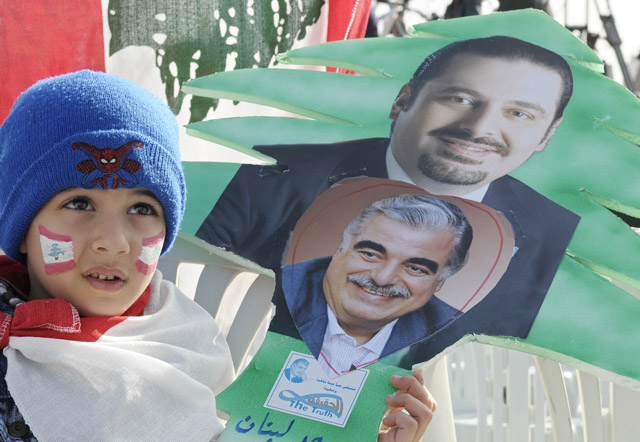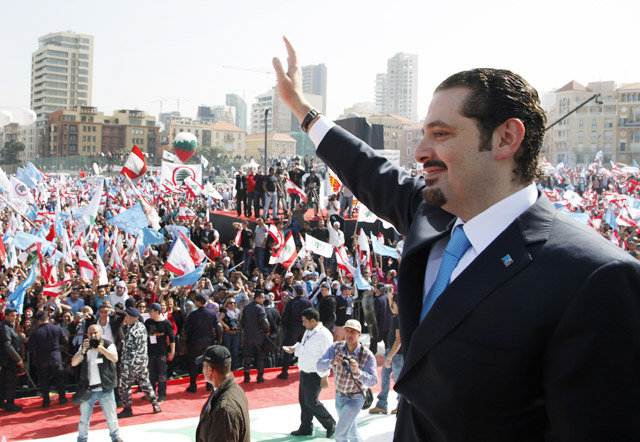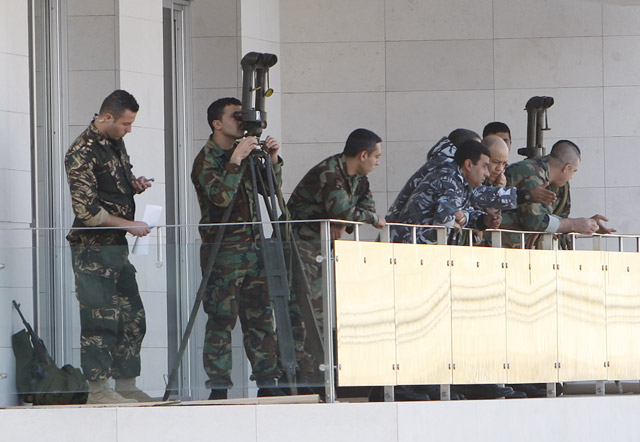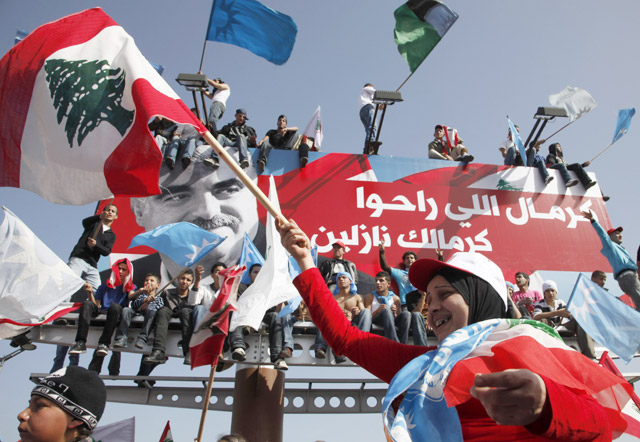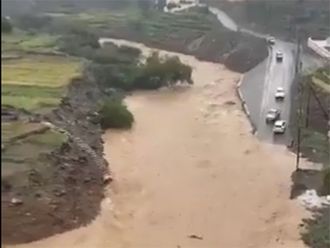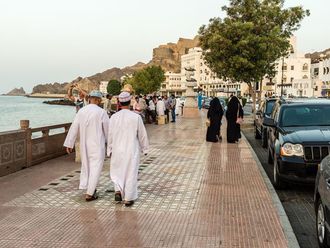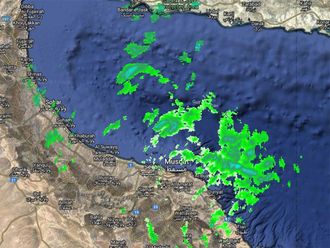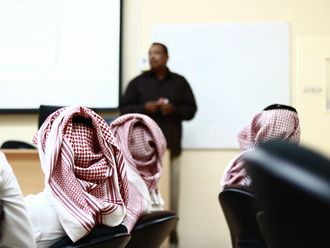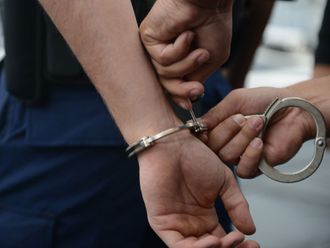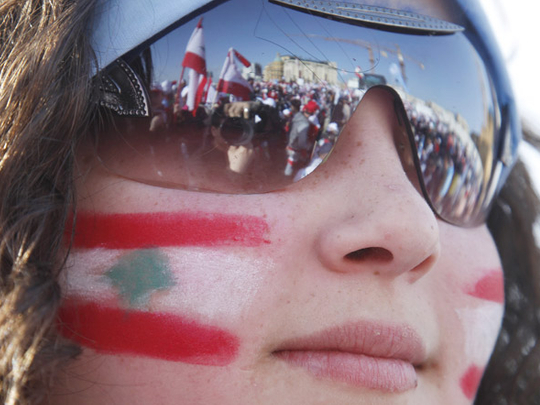
Beirut: Tens of thousands of people from all walks of life and sects yesterday poured towards the Martyrs Square in downtown Beirut to mark the fifth anniversary of the assassination of former prime minister Rafik Hariri.
"Five years ago, you came down to this very square to demand justice and freedom ... and we are not turning back," Prime Minister Sa'ad Hariri, son of the slain premier, told the cheering crowd.
People walking down the hills of Beirut towards the Martyrs Square said their participation in yesterday's major event reflected their deep sense of hope for their country's unity.
Supporters of the "March 14" camp waved flags and chanted pro-Hariri slogans and national songs. The old, young, children, even people in wheelchairs took to the streets carrying Hariri posters and the Lebanese flag, some draped in their national flag as they walked amid tight security through streets leading to the Martyrs Square.
Buses transported people from different parts of Lebanon to Beirut. Young men and women waved flags and Hariri posters from bus windows and music blared from cars crowded with people travelling towards the site for the massive rally in downtown Beirut.
Many people slept in the square on Saturday night to ensure participation in the anniversary. Restaurants in Beirut celebrated Valentine's Day on February 13 because February 14 was the day people remembered Hariri's assassination.
The weather was unusually hot for February in Beirut but people showed up. It was like a picnic for many. Some men brought their argillehs (water pipes) and sat under the sun smoking and cheering. Vendors were busy selling coffee, water and bagels to the crowds.
The crowds chanted Jibran Tueini's oath: "We swear by God to remain united, Muslims and Christians, forever to defend the Great Lebanon."
Tueini, publisher of Al Nahar newspaper and a fiery critic of Syria, was killed in a car bomb in 2005.
Tribute
Lebanese politicians led by Hariri's son, Sa'ad, the prime minister of Lebanon, stood in front of Hariri's grave and paid tribute to the slain former leader.
"I have insisted on participating today out of loyalty to Rafik Hariri and his principles. He was working for Lebanon and died for Lebanon. None of the politicians we have today are like him, nobody can replace him," a housewife from Beirut who gave her name as Samar told Gulf News.
"We are all Hariri," two elderly women chanted. People remember Hariri as the man who rebuilt the country and united it.
The majority "March 14" camp led by Sa'ad Hariri and backed by Saudi Arabia and the West has rallied for the February 14 gathering to invalidate rumours that people would not show up as a result of a rift in their ranks.
Hariri's alliance was dealt a heavy blow when Druze leader Walid Junblatt, once a fierce critic of Syria, defected in 2009 and moved closer to the rival Damascus-backed Hezbollah-led camp. Junblatt attended the rally but would not give a speech.
The killing of Hariri altered Lebanon's political scene. Massive demonstrations following the assassination and international pressure led to the pullout of the Syrian troops from Lebanon, ending a 29-year-old military rule.
But many Lebanese are worried about the possible growing influence of Syria in their country. The mass rally comes after Prime Minister Sa'ad Hariri reconciled with Syria whom he accused publicly of killing his father in 2005.
Here are some key events in the murder investigation:
April 7, 2005: The UN Security Council sets up the International Independent Investigation Commission after a UN fact-finding mission concludes that Lebanon's investigation is seriously flawed with evidence having been planted and tampered with.
October 13, 2005: Ghazi Kanaan, the Syrian interior minister, commits suicide. Lebanese opposition figures say he was considered a suspect in the Hariri assassination.
October 21, 2005: Detlev Mehlis, the first chief UN investigator, submits reports to the Security Council and alleges that senior Lebanese and Syrian intelligence figures were involved in the assassination. That claim has not yet been proven.Syria categorically denies the report, saying it is politicised.
August 30, 2005: Four high-level Lebanese intelligence and security officers once part of the pro-Syrian government are arrested on suspicion of involvement in the assassination.
May 30, 2007: A Security Council resolution authorises the establishment of an international tribunal to try suspects in the Hariri assassination.
February 24, 2009: Robin Vincent, the tribunal's registrar, says it is possible for heads of states to be brought to the tribunal but it will be the prosecutor general's decision. The Lebanese judges will be kept unidentified for security reasons, he confirms.
February 25, 2009: Three suspects detained in connection with the assassination are released from a Lebanese prison, just days before the inauguration of the tribunal in The Hague.
The charges against Lebanese brothers Mahmoud and Ahmad Abd Al HAal and Syrian national Ibrahim Jarjoura have not been dropped and they could still be summoned by the tribunal.
The Abd Al Aal brothers, members of a pro-Syrian, Sunni fundamentalist group called the Ahbash, were detained in October 2005 on suspicion of involvement in the assassination.
According to one of Mehlis' reports, Mahmoud Abd Al Aal allegedly called Emile Lahoud, the then Lebanese president, just minutes before the blast. Lahoud denies the call took place.
Jarjoura had been charged, after turning himself in in January 2006, with giving a false statement. He said he had lied to UN investigators after a member of parliament from the opposition paid him to do so.
February 27, 2009: A Lebanese judge rejects a request to release Azar, Sayyid, Al Hajj, and Hamdan.
March 1, 2009: The Special Tribunal on Lebanon holds its first session in The Hague.
April 29, 2009: The tribunal has ordered the release of four Lebanese generals held without charge since 2005 over the killing of former prime minister Rafiq Hariri.
- Compiled from agencies
Do you think that justice will ever be reached in the murder of Rafiq Hariri? Who do you think is behind the assassination? Will the tribunal bring justice or further stoke tension?


